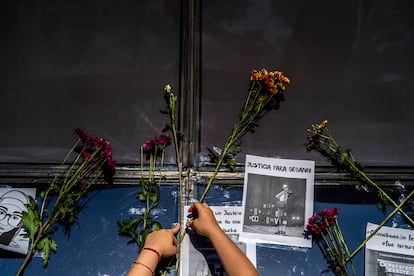The importance of taking to the streets on March 8
Women are accused of being criminals, but these crimes are not being committed by women breaking the rules but by those who follow the rules in a feminicidal state


Today is March 8 and it is very hot in Mexico City, even at night. The streets have been filling with jacarandas in bloom and later they will be filled with purple and green handkerchiefs, banners, graffiti, slogans, collective actions, and all manner of expressions of resistance. It seems that March 8, popularly known as 8M, is annoying; it seems that being a feminist is out of fashion - as if it were a fashion – and that there are other issues on the state’s agenda, as if there were more important issues than women’s lives and freedoms. It seems there are other issues to be dealt with in the press, as if these issues were not relevant. But look at them, here they come again. Another 8M. Don’t they get tired of the same old chatter? What if this, what if that… we’ve heard it all before! Besides, who can we talk to? There is no manager, no hierarchy, no leader: they are a nuisance, look at them. Why don’t they stay in their offices or at home? Besides, they contradict each other: yes or no? Do they want another 8M to wreak more havoc in the streets? Damn old women, they are more violent than men, don’t you think?
I heard something like this a few days ago regarding this year’s 8M. Another man said: “Fucking women, that’s why they stick up barricades and send the police out.” He was an older, plump man, with white false teeth, a man in a position of power who was ranting against the government and feminists, as if they were two opposing sides.
It left me thinking about the importance of marching today. It seems that femicides on a daily basis, the fact that abortion is not decriminalized throughout the country, the lack of a feminist perspective in the workplace, women earning less than their male counterparts, the lack of women in managerial positions, the hyper-sexualization to which we are exposed from childhood, the amount of “jokes” against anything feminine, the structural transphobia that trans women face every day, the discrimination against the LGBTIQ+ community, the obstetric violence in so many places, the lack of diverse female references in a large number of cultural spheres, the gender roles taught to girls, the fatphobia to which girls are exposed from a very early age and violence against women on so many levels is an issue for just a single day in March, but this day also serves as a reminder that there are feminists who fight every day on all of these fronts.
M8 can be annoying for a man like the one I had to listen to and as well as the heat - too many degrees, too many words from someone like that - today can also be annoying for other people, perhaps because it gives visibility to the anger at the reality that we women live in. Rules are broken on this day, yes: It’s not all purple flowers, hugs and sisterhood. Many of the symbols associated with femininity have changed in recent years. The color pink, for example, has also become a symbol of resistance, as has violet, so similar to the jacarandas carpeting the spring, and perhaps also alluding the feminist bloom in Latin America. Women are accused of being criminals for graffitiing or breaking things, but these crimes are not being committed by women breaking the rules but by those who follow the rules in a feminicidal state.
Why are we marching today? Because it seems they are listening to us; that we are fed up with the same thing. It seems that we are uncomfortable for the government, that we are uncomfortable for many, but the reality is that the numbers are increasing. From January 2022 to January 2023, femicides have increased. Last year gender violence in all its forms reached historic figures: 32% higher in 2022 than in 2021, and last year’s figures were 235% higher than 2015, the year in which the registry of violence against women was set up by the National Public Security System. Why is violence on the rise? Perhaps, in part, because of the indifference of the state, or the direct participation of the state in the revictimization of cases, and the lack of professionalism in investigations so far beyond the reach of justice and even farther from the truth.
The wonderful journalist Lydiette Carrión investigated, meticulously and independently, some cases of femicides of murdered teenagers in the State of Mexico. As a result of that investigation, she noted: “When the poet Juan Gelman referred to the disappearance of his son and daughter-in-law at the hands of the Argentinean dictatorship, and the subsequent search for his granddaughter [who was given away in an illegal adoption her parents’ executors), he insistently said that for the Athenians the antonym of forgetting was not memory, but truth. He was referring to a simple truth, not a rhetorical one. In this case the truth would be who the disappeared women are, who took them, what they did to them and where they are.” This is also why we march on 8M, in support of that truth.
It is important to take to the streets on this post-pandemic 8M, which will surely give rise to a resurgence of the strength that can only be gained from them. There have been significant achievements in Latin America since street mobilizations began - the decriminalization of abortion in Argentina, for example - and part of that strength lies in the repetition of signs, banners, slogans, songs, green and purple handkerchiefs until the narrative changes. When the context is even more acute, as in our case amid increasing violence, repetition generates more strength, a broader reach. In this sense, street mobilizations are very similar to rites, which are always a collective behavior. As the philosopher Gadamer says: “The rite is not a way of speaking, but a way of acting.” That is also true of a march where individuality does not matter, but what the collective has to say. That is why the same words are heard at the back as at the front, there as here, and that is how the collective gains strength. Of course, different reasons drive the marches, but this year 8M specifically brings gender issues to the attention of the government, to the editorial boards, to social networks, and to public discussion.
And so, we return to that character who rants against feminists and the fourth transition, on whose office wall hangs a diploma from the Marist Fathers’ school he attended and who lights a cigarette with the stub of one he is about to finish when the friend I am with and I tell him that we are feminists and that, in fact, we are going to go to the march: “Ah, gee... Well, I do have to admit that we men have really looked bad in the eyes of women, yes or no, girls?” In times so inclined to seek polarization between sides, between men and women, between feminists and the state, between left and right, I hope that this 8M also serves to show that it is not about sides. In a march, as in a ritual, the community is not a spectator but part of the action. We are all involved; 8M appeals to all of us equally, including to that man to whom my friend and I will send greetings from the street today, on your behalf also, with a banner so like so many others.
Sign up for our weekly newsletter to get more English-language news coverage from EL PAÍS USA Edition









































